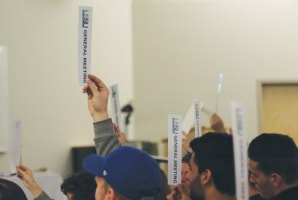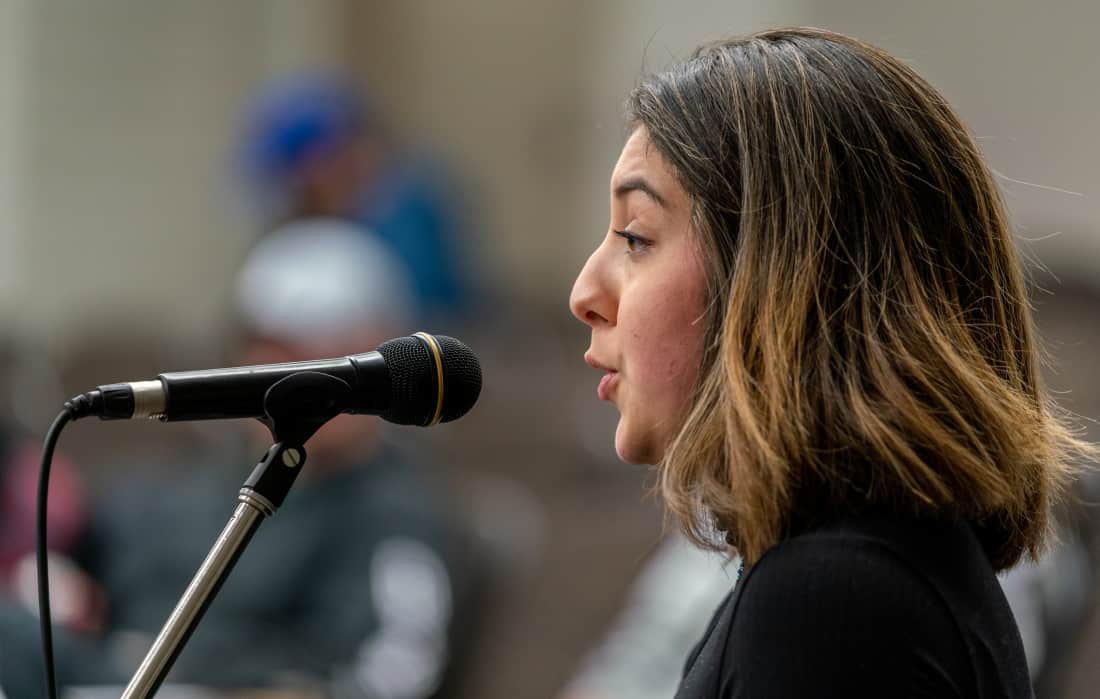“We are holding the University of Saskatchewan Students’ Union accountable to their duty to represent internationals as much as they do other undergraduate students,” says María Celeste Nuñez.

“I think that in 12 months we’ve done a lot. We put this issue on the table.”
It was at the start of the 2019 Fall Term that Nuñez, an Ecuadorian student in environmental earth sciences, first proposed changing the bylaw of the USSU. After years of leadership roles and community involvement, Nuñez was looking forward to running as a candidate for the USSU vice-president student affairs.
Her plans came to a halt when she realized that, like all other U of S international students, she was not able to hold an executive position at the students’ union.
The one-year mark
Over the last year, Nuñez has seen motions for changing this restriction go unapproved at two USSU general meetings, the second one of which did not include a vote due to an early adjournment. The University Students’ Council then voted against holding a third meeting.
Nuñez is now entering the new academic year as an elected international students’ representative in the USC. She is still determined to fix what she calls “a systemic, institutional problem that no one was looking at.”
“By this point I would have liked to see these barriers taken out, and international students be able to participate in executive roles,” Nuñez said. “But I think we are in a good position now because we started a conversation.”
It took some time for Nuñez to arrive at this optimistic outlook. Looking back at the USSU 2019 Annual General Meeting, the first time her motion was up for vote, she remembers feeling defeated, and frustrated with the USSU executive’s statements before the vote.
But with time and perspective, Nuñez sees the AGM as simply one step in an ongoing process.
“I now realize that this type of change takes time,” Nuñez said.
Weakened relationships

In their attempts to change the bylaw, Nuñez and other student leaders from the International Students’ Association have often been at odds with the students’ union over the past year.
Nuñez says that the relationship between the two groups reached a low point after the failed Special General Meeting and the vote against a second SGM.
“After getting defeated twice, and seeing no change happening, I think the relationship between us and the USSU got really weak. There was definitely no trust between us,” Nuñez said.
“However, now we’re starting to build some bridges.”
This year, both Nuñez and InSA President Abhineet Goswami are part of the USC and sit on the USSU International Student Advisory Committee. Goswami hopes to use his position as co-chair to move along the process of changing the bylaw.
“I would like the USSU to give this topic to the International Student Advisory Committee,” Goswami said. “This year my major goal will be keeping this topic on the table, and including more and more students in this cause.”
This is also USSU President Autumn LaRose-Smith’s hope for the committee, and she is open to the group being “the taskforce for the USSU to work on this issue.”
Finding a path forward
The students’ union is starting the year busy with a pandemic on their plate. However, LaRose-Smith says that after the summer’s COVID-19 planning, the executive is now starting conversations on how to open their positions to international students.
There are several considerations to the issue. The USSU bylaw barrier can be amended by vote, but the union has been concerned from the start about the Saskatchewan Non-Profit Corporation Act, which requires 25 per cent of a corporation’s board of directors to be Canadian.
“Those things are completely out of our control,” LaRose-Smith said.
The USSU has been reaching out to other local non-profits that have sidestepped this issue successfully, including the the University of Regina Students’ Union and, even closer to home, the U of S Graduate Students’ Association.
While LaRose-Smith is not confident that the bylaw change will happen in time for the USSU 2021 elections, she says the union has learned a lot about the situation in the past year, and pursuing this change is a clear goal for them.
“I think we have to be really creative and get as many hands on deck as possible to figure it out,” LaRose-Smith said.
“If you’re a paying member in the union, you should have every right to be a representative.”
A year for advocacy
Nuñez and Goswami have every intention to keep pushing the issue this year, but they are not putting all their eggs in one basket.
Goswami, as the InSA president, is also determined to build the association up by bringing international students together.
“We need more awareness on what’s happening,” Goswami said. “If there is a law or something like this that [means] we don’t have a right, then we can get more support and we can stand [up] for our rights.”
For Goswami, focusing on InSA is a way to build support for international students outside of the students’ union.
“We are trying to be independent,” Goswami said.
For Nuñez, this year will be about keeping international students’ issues on the USSU’s table. Now in her final year, she is not planning to run for any executive positions before graduating, but she still hopes to leave the university having opened up the opportunity for others.
Beyond the bylaw change, Nuñez hopes the union will grow in awareness of international students’ specific needs and move towards addressing them in more intentional ways.
“I want actionable items. I want to see a change to allow international students to be part of our leadership. I want to see more mental health advocacy for international students,” Nuñez said.
“I don’t think they realize that the international student community is a very vulnerable sector.”
To learn more about the International Students’ Association, visit their Facebook page.
—
Ana Cristina Camacho | News Editor
Photos: Heywood Yu, Caitlin Taylor
Leave a Reply